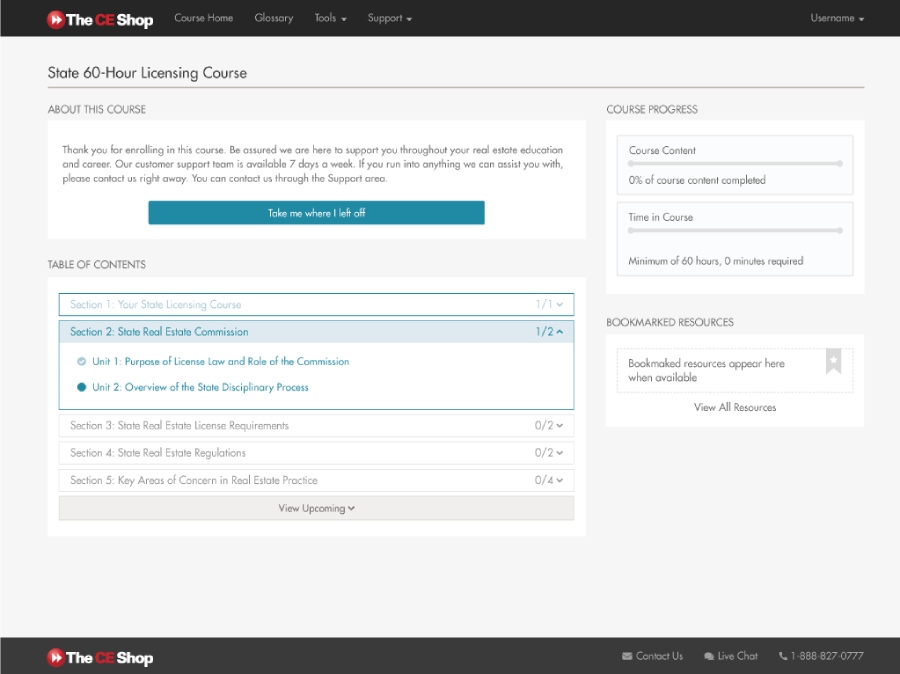Every state requires real estate agents and brokers to complete continuing education (CE) coursework to keep their licenses active and stay up to date with laws and regulations. To renew your license, you need to know your state’s specific requirements. This typically involves completing a specific number of CE course hours within a set time frame, submitting a renewal application, and paying associated fees. By knowing how to renew your real estate license, you can provide effective service to your clients and keep your license active.
If you haven’t gotten your real estate license yet, but it’s on your to-do list, check out our article How to Get a Real Estate License in Every State.
1. Understand the Different Continuing Education Options
When learning how to renew your real estate license, it’s important to note that all states will require a certain number of continuing education hours to renew their licenses as well as subsequent renewals. However, in some states, like California and Nevada, newly licensed agents must fulfill several additional requirements for their first renewal only. Meanwhile, in other states, like Alabama and Louisiana, post-licensing education is required to remove the provisional status of your license.
Here are the four types of continuing education options to complete for your real estate license renewal:
In several states, newly licensed agents and brokers are required to satisfy additional education hours after they pass the exam. Though mandatory post-license education varies by state, courses typically include new laws and regulations in real estate. Agents and brokers must complete this before their first real estate license renewal, usually within one to two years of initial licensure to keep their license active.
For instance, Florida agents must complete 45 hours of post-licensing within 18 to 24 months of initial licensure, while Vermonters must complete eight hours of post-licensing within nine days. Other states have longer renewal periods. Agents in South Dakota, for example, can complete each 30-hour post-license coursework (of the 60 hours) every licensing period.
Here are the states that require post-licensing education:
- Alabama
- Alaska
- Arkansas
- Delaware
- Florida
- Georgia
- Idaho
- Illinois
- Indiana
- Kentucky
- Louisiana
- Mississippi
- Ohio
- Oregon
- Pennsylvania
- South Dakota
- Tennessee
- Texas
- Utah
- Vermont
- Virginia
- Washington
In certain states, newly licensed agents need to complete special requirements for their first license renewal if they intend to continue their real estate practice. First-time license renewal may require more hours on a specific subject compared to subsequent renewals.
For example, in New York, first-time renewals require two hours of agency law, while subsequent renewals only require one hour of this subject. In California, the first real estate agent or broker license renewal requires 15 hours of mandatory CE courses, while subsequent renewals require 18 hours of these core courses.
The following are the states that require first-time renewal for real estate licensees:
- California
- Delaware
- Nevada
- New Hampshire
- New York
- Texas
- Washington
After post-licensing and/or the first license renewal, you then need to renew your license every cycle to keep your active status. Some states, like New York, don’t offer a grace period. Therefore, you must complete the CE requirements on time to receive the certificates and submit the additional paperwork and fees by the deadline.
In some states, the required number of continuing education hours for subsequent renewals will decrease. For instance, brokers in South Dakota only need to complete 24 hours of continuing education to renew their license, compared to the 60-hour post-licensing education requirement.
When renewing your real estate license, your state may have you complete certain hours of mandatory and elective courses. Mandatory courses are specific subjects required by the state for license renewal. For example, active sales agents in Texas must complete eight hours of Legal Update courses every two years to renew their license. For elective courses, many states allow you to choose from a list of approved real estate professional courses specified by your real estate commission.
In another example of how to renew your real estate license in Nevada, agents need 18 hours of mandatory and 18 hours of elective courses. The following are the mandatory courses Nevadan agents must complete every two years:
- 3 hours Agency
- 6 hours Contracts
- 3 hours Ethics
- 3 hours Law & Legislation
- 3 hours Risk Reduction
The remaining 18 elective hours can be any of the following general courses*:
- Foundations of Real Estate Finance
- Keeping It Honest: Understanding Real Estate and Mortgage Fraud
- Residential Property Management Essentials
- Marketing, Advertising, and Social Media Compliance
- Technology Tools, Trends, and Risk Management
- Taxes and Real Estate: What You Need to Know
*Courses can be found on The CE Shop
You can choose from hundreds of mandatory and elective course topics offered by local and national real estate schools. When you purchase continuing education courses online, consider the elective topics and how they will help you grow your real estate business.

The CE Shop sample dashboard (Source: The CE Shop)
You can check state-approved mandatory and elective courses from The CE Shop. With courses available in all 50 states, The CE Shop is a leading online real estate school that offers customizable continuing education. The school utilizes a custom LEAP platform, so active agents can access their courses at home, at work, or on the go and complete their coursework at their own pace.
2. Learn the Real Estate License Renewal Requirements in Your State
Now that you know the types of continuing education offered around the country, it’s time to narrow it down to see what is necessary in your state. As mentioned, each state requires real estate agents and brokers to complete specific hours of continuing education within the license renewal period, which is anywhere from a one- to four-year cycle.
The number of education hours and the length of the renewal period differ by state. After completing the coursework, real estate professionals must also submit a renewal application form and pay a renewal fee. For example, check out examples of state-specific renewal processes below for comparison. Note how Ohio requires both post-licensing and CE hours, while New Jersey only requires CE:
Requirements | Ohio | New Jersey |
|---|---|---|
Post-licensing Hours Required | 10 | N/A |
Post-licensing Cycle | 1 year | N/A |
CE Hours Required | 30 hours | 12 hours |
CE Renewal Cycle | Every 3 years | Every 2 years |
Renewal Fee | $182 | $100 |
Additional Forms to Submit |
|
|
How to Submit Renewal Forms | Mail or online portal | N/A |
Because of the vast differences between states, it’s necessary to research what your state requires before taking any courses. Take a look at your state below to see what your state needs for renewal:
State-by-state License Renewal Requirements
3. Choose a Real Estate School to Complete Your Coursework
Similar to prelicensing courses to become a real estate agent, the CE courses you choose must be from a school approved by your state. While some states, like North Carolina, require real estate professionals to take all CE courses in person, most states allow real estate agents and brokers to take either in-person or online courses.
Taking your real estate education online is more convenient, as you can complete courses between your busy schedule and at your own pace. Admittedly, some real estate professionals learn better in a traditional classroom setting. When choosing your CE course format, consider the cost, your schedule, and your learning style.
These are the course formats offered by real estate schools:
- In-person classes: This is a great option for those who learn best in a traditional setting. While they can be more difficult to schedule, they provide direct access to real estate experts in your state.
- Online self-paced lessons: Online courses are often the most affordable and convenient option to complete your CE credits. You can complete each lesson on your own time. However, reading large amounts of text-based materials can be challenging for some agents.
- Live webinars online: Live webinars marry the convenience of online courses with the support of a live instructor. However, they are not offered frequently and only through a few real estate schools.
- On-demand video lessons: On-demand lessons are self-paced and can help agents and brokers with various learning styles. However, they can be more expensive and not widely available in most schools.
- Home study: This format allows you to read through a hard copy textbook and mail your exam questions to prove course completion. Kaplan is one of the few online schools offering home study options, or you may also check local schools.
Check out the best online real estate schools that offer accredited continuing education nationwide for license renewal.
Schools |  | |||
|---|---|---|---|---|
Best for | Access to all state-specific CE courses | Variety of CE course formats | Customizable online real estate education | Budget-friendly CE courses |
Key Features |
|
|
|
|
Price Range for CE Courses | $19.95 to $379.95 | $9 to $499 | $9 to $379 | $19.95 to $133 |
Learn More |
4. Complete Your Education & Submit Paperwork
After completing your CE coursework, the final step on how to renew your real estate license is to submit the necessary paperwork. Though these may vary by state, all real estate sales agents and brokers must submit the following general requirements:
- CE certificate of completion: Your school may take a few days to a few weeks to process this certificate once you complete your course. Although some states, like Michigan, do not require you to show a certificate of completion, you must have it on file when you submit your renewal application in the case of an audit.
- Renewal application: Find your state’s application form on its licensing board website. Most states allow you to complete and submit the application online, or you may need to print and mail it.
- Renewal fee: The renewal fee can be paid online or by mail, depending on your state. The costs range from about $32 to $300. Some states charge extra if you do not pay by a preferred method. Renewal fee amounts also differ by state and the type or status of your license.
In case your real estate license expires before completing the renewal requirements, you may still reactivate, but the process varies by state. Some states, like New York, will require you to retake the real estate exam and submit an application fee. Meanwhile, in Texas, if your license has expired for less than three years, the state allows you to renew your expired real estate license by completing the CE credits you missed and paying the late fees. Check your state’s Real Estate Commission website for specific details.
Frequently Asked Questions (FAQs)
Florida real estate licensees must renew their licenses every two years to continue operating legitimately.
To renew your Maryland real estate license, you are required to complete 15 hours of Maryland Real Estate Commission (MREC)-approved CE courses and pay a renewal fee of $70 every two years. Failing to renew your license will prevent you from operating as a real estate agent legally.
Yes, you can renew your NY real estate license even after it expires. However, you will need to retake the real estate exam and pay a fee for the application.
Bottom Line
To keep their real estate license active, agents and brokers must renew their licenses by the state’s deadline every mandated cycle. Requirements and time frames vary by state but generally include continuing education (CE) coursework, signed renewal forms, and renewal fees. If you don’t want to be charged with late penalties or lose the ability to practice real estate, be sure to know your state-specific requirements before submitting the necessary paperwork.